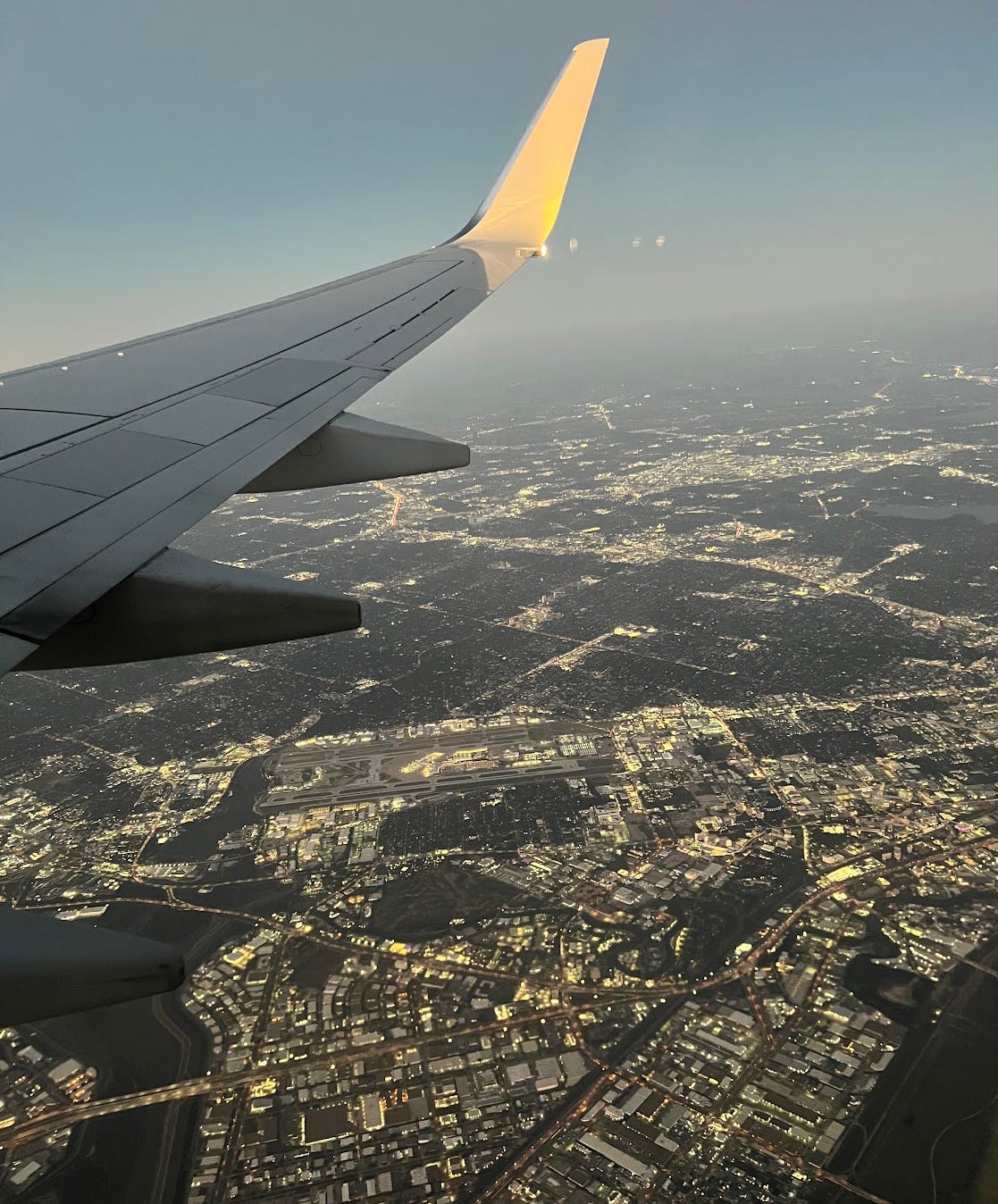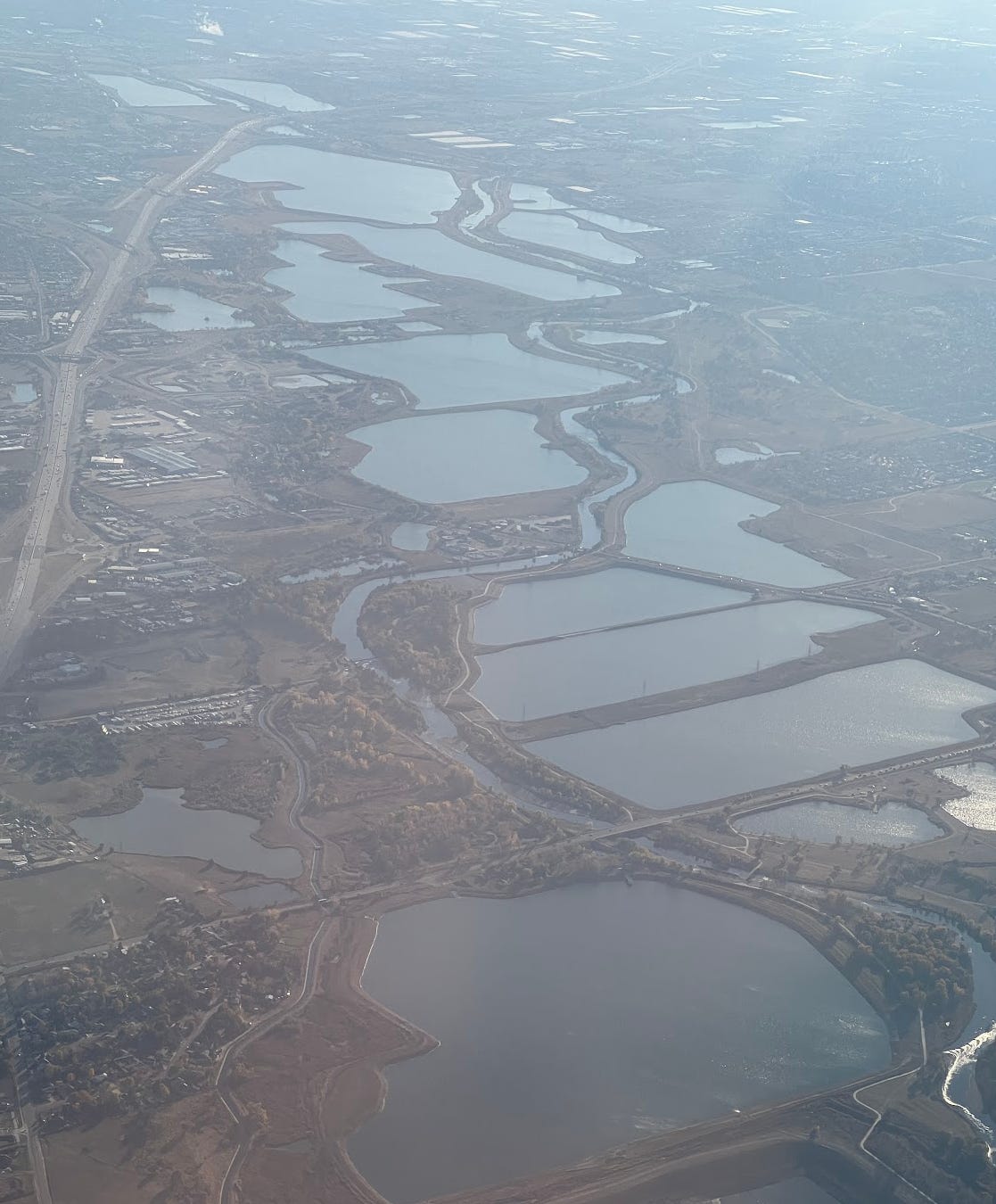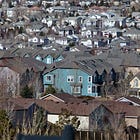The Weakest Word in the West
When it comes to challenging development in the West, there's a word Westerner's aren't allowed to use without consequences -- and it carries no power.
Posts on The Fleeting West are written and posted quickly and are often edited for clarity and quality later. For the best experience, see the copy on the website for the most up-to-date version.
One thing you learn quickly as a rooted Westerner is how the discourse around growth and development in the U.S. is shaped. The core pillar of American culture is the domestication of environment, people, and any threat that stands in the way of “progress.” Especially when those attempting to stop the spread of progress are people you think are the same as you and on your side — That’s when things get ugly.
I recently traveled south to the land of Texas. In this land, I learned [again] that Colorado has a fabled mystique. The people of Texas think they love Colorado - for its beauty, for the skiing, and as a vacation destination.
As lovely as it is to be automatically assumed to be interesting based on where I’m from, those I met didn’t realize something about me; I regard anyone with intent to move into the interior West as a direct enemy of everything about the Western way of life, our environment, and our culture.
Sure, we all look similar. We all wear clothes made in foreign countries. We drive cars all made with and powered by petroleum. We all live in shitbox American houses made of sticks and reconstituted industrial wastes (OSB, asphalt, and the like). We all eat food we bought at a national chain grocery store. We must all be the same, on the same team.
But we don’t share any understanding of the West, belief about the environment we live in, how we understand what it means to be a Westerner, to be in the West, or the difference between a domestic space like a city and where or what wildlands are. Our entire ethical and cultural identity around nature, land, and our position in each of the domains is completely different. So different, we might as well be from completely different countries.
When in Texas…
While talking to people in Texas, it’s clear I’m not from there; I’m physically fit, I don’t speak like my tongue has been stung by a bee, and I don’t accept “y’all” as part of the English language. So it naturally comes up … “Where are you from?” Well, I’m from Colorado.
As soon as my home area is revealed, the next words out of someone’s mouth is either how much they love Colorado or how much they want to go to Colorado. Skiing comes next1, despite ski season in Colorado being only three to four months per year, maybe five months on a big and lucky El Niño climate year (when we typically get more snow.) They never understand that most of the deeply rooted locals don’t use the ski resorts at all due to the absurd cost and logistics to get there, only to ski with a bunch of careless tourist idiots.
But in Texas, Colorado is known as a winter wonderland where you go skiing and where “God made the land beautiful…”
The perception of the state is tried and true — The State’s marketing efforts have paid off for the top 1% of our boosters, politicians, and corporations that benefit from mass tourism and tourist spending. And, I suppose it has paid off for we locals, too, given that everywhere we go, we’re regarded as being “lucky.” Seems like a reasonable tradeoff to be lucky in exchange for having our entire way of life, culture, and economy decimated.
And they always want to move here…
The next part of the conversation always turns to wanting to move to Colorado. That’s always a fun one. Have you ever seen Texas? It’s a sprawling mega-mass of McMansions, 12 lane highways, braided highway bridge networks, strip malls, chain restaurants, and indescribable junk as far as the eye can see. Open space, nope. Hiking trails, nope. High levels of social trust, nope. Homelessness, yep. Every square inch privatized, yep. Pride in community and environment, nope … and the list goes on.
There’s no clear vision for Texas’s built environment. None of the local environment is still intact. Everything is scraped, covered in garbage, or is a piece of infrastructure to make all of this civilization happen. It’s an entirely human-domesticated place. The people don’t drink tap water here because it’s too polluted, so they exclusively drink bottled water. They’re stuck in traffic for hours just to get to and from their job on massive networks of 12 lane highways.

Texas is PERFECT America - it is the epitome of what America is and does to every single place it touches. Everyone is in debt. Every piece of land is claimed. Every activity is planned and curated to allow for an entertaining experience. Texas is the antimatter-opposite of everything the interior West is — and the people are, too.
Nothing in Texas requires you to be prepared, to navigate without signage, and anything from the environment that posed any potential risk has been mitigated from posing any threat.
When people from places that are entirely human dominated, domesticated and altered say they want to move into the interior West, it causes my innards to turn. Because that’s not the place that I want to live — it’s not the contract the people rooted here have with the place we’re from to expect all dimensions of the environment to be curated to assure entertainment and safety.
The most taboo word in the West is “No.”
Imagine how this conversation would go if, as a so-called American, instead of being diplomatic and placating the people who say they want to move to Colorado from entirely urbanized areas of the country, I said what most other Westerners and I are thinking during this inevitable and repetitious conversation …
“Please, whatever you do … do not move into the interior West.”
It’s a direct act of interpersonal warfare. I’ve seen it done and it never goes well. There’s no shared understanding about why, what’s at play, and that it’s not personal. It is immediately taken personally. And so, inevitably, we Westerners stay quiet and placate and play along, even though we’re thinking:
“We have too many people already, not enough water to go around, we live in an environment that is entirely dependent on wildfire, and those who aren’t acculturated to this reality will needlessly exacerbate every single element that is causing the West to become the same exact Hell *y’all* are from. We don’t want your economy in the West, your sense of what “the good life” is, or your political and cultural norms. We don’t want our environment wholesale converted into the same place you came from. We don’t want your urban economies and inflated housing prices. We don’t want what you had here. It’s not you personally, we just don’t need any more people here and we don’t want to live like you do …”
Yeah, it’s a total conversation killer. It’s a job and opportunity killer. It’s an interpersonal act of warfare and social suicide. So, we just don’t do it - we stay quiet and keep the peace.
More urban culture in the West? No thanks.
Every single person moving to Colorado today is directly driving demand for housing that does not yet exist. Land is being consumed more rapidly than at any time in history to make room for more people. We NEVER had enough housing for 3 million, 4 million, or the now 6 million people living in Colorado — every single person inbound is creating demand for entirely new housing, and therefore, newly domesticated space2.

Every single person moving to Colorado today creates demand for water that was scarce and strained for three million people, but is now being expected to sustain six million people, and is already being adapted to serve 12 million people (coming soon). Water is only being delivered to the three million new people who have relocated to the arid state in the last 30 years thanks to the dividing out of water into smaller and smaller amounts available to each individual, and the removal of farms in exchange for dense urban housing. We’re not making new water for the transplants; We’re directly shrinking the water available to the rooted residents to make room for the new3.
Every single person moving to Colorado and the West brings the place they’re from with them. From the stores and materials they create demand for, to the houses they find familiar and want to live in, to their tolerances for what kinds of spaces they want to spend their money and time in. They create invisible demand for all the things they had at home, but with the Colorado image as their backdrop. They bring highway expansions, ski resort expansions, crowded highways, exponential incrases in housing prices, ridiculous house designs suited to entirely other areas of the country (not the West). They create the seas of garbage they created demand for in their home areas, but in Colorado and the West, instead.
Every single person who moves to Colorado and the interior West directly creates demand for the place they’re from to be remade here, rather than keeping the place up as the place they came for.
Those of us from here don’t want to live in Texas, California, Florida, New York, Illinois, New Jersey, Georgia, Virginia, or Indiana. If we did, we would move there.
When we say “no,” we are worked around
As development sweeps across the mountains, plains, and deserts of the American West, the conversion from what the place was to the quintessential American cultural landscape, the place Westerners are rooted in is erased. The place migrants think they’re coming for is erased. The imagined image of the West is erased. And the fables of the West are made entirely mythical.

But if we Westerners stand up and say, “No…” there’s hell to pay.
Watch a local planning and zoning or council meeting in any Western city today and you’ll see that “no” doesn’t work — it never stands.
As demand for Western land for development has increased, supply has increased symmetrically. My hometown has tripled in population in 30 years with the help of investors, developers, lawyers, and those creating demand for new urban spaces. The conscientious locals have been standing up and trying to say “no more!” and are always met with greater force to push development forward than their attempt to stop it has carried.
“Who are you to try to put a stop to development?” That’s the first question that detractors ask. And we all know the answer — there is no stopping it. We all drove development of domestic space at one point and in some way. The only difference is what our vision was for how development should happen, and how it shouldn’t. If you’re on the side of how it shouldn’t, you lost before you had the chance to object. Because this is America, and we never say no to development and growth, even if it’s clearly destructive and makes no sense at all.
Instead, we all simply endure whatever the winds of change blow in, even if the change blowing in is entirely counter to the reason for blowing in.
Urban expansion in the West is part of a deep cognitive dissonance in those creating the demand
More than 60% of the people I know in Colorado are not from Colorado, and 60% is an extremely generous minimum. At this point, I think it’s really closer to one in five being reasonably from the state and region combined. That’s pretty wild if you think about it — there are more people in a place than are from that place by a factor of hundreds of percents. That should cause some pause and contemplation about what’s happening here.
In the Boulder area, we have a saying that, “No one in Boulder is from Boulder.” Boulder was taken from the locals decades ago and is now entirely a California and east coast colony, held only for the upper economic classes.
The irony is that people are infatuated with the West over its beauty, its environment, the false belief they’re coming for unbridled adventure, and the kindness of its people. Meanwhile, every belief they have, everything they create demand for, and every action they take is completely counter to the things they think they claim to love about it4.

When someone from outside the Western states say they want to move to Idaho, Colorado, Montana, etc., they’re saying they want to go create demand for the culture, economy, and environment they’re from … instead of the place they think they want to be.
If we accept that every human’s identity is framed by their culture, and that every culture is shaped by the environment it forms in, then the act of moving from Tampa, FL5 to Fort Collins, CO, is a decision to bring a piece of Florida to Colorado to make it familiar for oneself and fellow Floridians6.
For those of us rooted in the West, we aren’t interested in living in Anaheim, CA - or an environment that looks like it7. We never wanted to live shoulder to shoulder with urbanites, their highly disconnected urban cultural norms, and entirely built environments. We didn’t want HOAs, McMansions, condos, strip malls, and mega highways. We didn’t want to be part of urban cultures where people are homeless and transplants can push locals out of their homes with their vastly greater economic power from working greed- and scam-economy-rooted jobs that pay suspiciously excessive salaries. Yet, we Westerners are not allowed to say no to urban expansion into our home areas.

We want to say no to the total conversion of our environment, economy, and culture into something familiar to cultural urbanites and not to us.
But we can’t - saying no is not allowed - socially, economically, or politically. We’ve tried, and the urban migrants have bought our politicians, our land, and fundamentally altered who gets elected to our political offices8. They work in our local governments, chambers of commerce, and visitation bureaus. The system now works entirely in their favor and not ours.
And all they did was to want to move West. They just rented an apartment, then bought a house, just like anywhere and anyone else. When Shakeshack realized there are enough east coast urban transplants here, they built a location or two — those they built for were excited to have a taste of home while the locals had no clue what that was and why you would need that. Create the demand, and someone will respond with supply — that’s how America works.

It’s an obvious and ironic dissonance to move to a place for the beauty of it, only to convert it to the place being fled — a place that can only be assumed to be domesticated and ugly, given the openly-stated lack of “amenities” like “we have here” — And then to socially and systematically circumvent the locals from the power to say “no” to new and sprawling developments that actively and completely decimate the character that made the place attractive in the first place. It’s exactly how the mountain pine beetle parasite operates, and it’s troublesome to see how similarly migrants in the West behave to these whole-forest-decimating parasites.
The Fleeting West is written by a rooted Westerner who has been experiencing the wholesale conversion of the West to an urban American wasteland since childhood.
“Adventure” is the modern fashion accessory that every urbanite seems to want these days - check out this prior post about that, here:
The West’s housing prices have more than doubled in a few short years, and in some areas, more than quadrupled … another brick in the urban wall taking the West by storm:
Water is a big issue in the West - and the reasons for increasing scarcity are often being obscured behind a small, trailing variable. More about that here:
In the photo of Colorado’s urban air pollution, I note that the state has some of the worst air quality in the country - here’s some extra reading that explains that comment:
https://www.lung.org/media/press-releases/state-of-the-air-colorado
Do we want Colorado to look like Tampa? Nope. It’s a shithole:
https://maps.app.goo.gl/wVxV6UynjxMwoz3X9
Check out this older post about the way the place we’re from shapes the way we think in the places we move to …
Take a gander at Anaheim, CA - it should be no surprise that Coloradans don’t want our state to look like it (be sure to turn on “Satellite Images”):
https://maps.app.goo.gl/xj6ik1wm7TPGo4LX9
I touched on external influence on our local elections in Colorado in a prior post - here’s a link if you’re interested:










Possibly a parallel -- I have worked in a specialty branch of engineering where the main industry companies are now relocating to Colorado Springs (most likely a result of a political decision in DC), and thus have recruiters trying to entice potential employees to move. Nothing against Colorado Springs, I've enjoyed my visits there. But home is home, and if companies want me to relocate, then I'm looking for local work, outside of my specialty.
Another thing about moving in search of the "golden wilderness", how capable are the new transplants in taking care of themselves? (I think you have already addressed this in a previous 'stack.) I'll add - how capable are they in dealing with open space (state parks & if lucky, national parks) near their current homes? My favorite place to ski is near the base of Mt. Washington in NH - practically "just" a pimple at slightly over 6000 feet, but at the confluence of some extremely deadly winter weather, ready to Darwinize the unprepared who think that a winter hike sounds good.
BTW, the next time you travel to Texas, I'd recommend a visit to Big Bend National Park. Its beauty is just barely matched by its isolation! (Bring a telescope too, if that is of interest.)